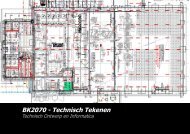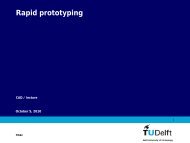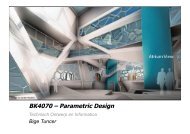change from one means of transport to the other and by provid<strong>in</strong>g additional functions that are<strong>in</strong>tegrated <strong>in</strong> the transportation node, space can be used efficiently <strong>in</strong> numerous ways. Thedevelopment of mobility hubs (knooppunt) is also a priority for city renewal (Bureau RegioRandstad, 2001).2.3. ICT development and <strong>in</strong>fluence on spatial plann<strong>in</strong>gThe present time can be described as the age of <strong>in</strong>formation or moreover, it is an era ofcommunication and <strong>in</strong>formation/knowledge exchange. Today it is difficult to imag<strong>in</strong>e lifewithout tools that make this feasible, but a long journey to get to this po<strong>in</strong>t was required.Information footpr<strong>in</strong>ts of different civilizations are everywhere to be found. The first sketches oncave walls tried to hand over <strong>in</strong>formation and knowledge from their time. Thanks to thesedraw<strong>in</strong>gs and archaeological f<strong>in</strong>d<strong>in</strong>gs, we can understand history and the ways our contemporaryworld is be<strong>in</strong>g shaped. That was perhaps, <strong>in</strong> the most abstract way, the very beg<strong>in</strong>n<strong>in</strong>g of ICT.Later, written text was <strong>in</strong>scribed on stones and walls, followed by writ<strong>in</strong>gs on papyrus and paper.With the development of pr<strong>in</strong>t<strong>in</strong>g technology, books and newspapers were published, followedby the <strong>in</strong>vention of radio, television, telephones and fax mach<strong>in</strong>es. In short, <strong>in</strong>formation started toglobalize. Development of computer technology happened and a real breakthrough <strong>in</strong> ICT wasthe development of World Wide Web (WWW) that revolutionized the computer andcommunication. These previous developments made it feasible to <strong>in</strong>tegrate various capabilities sothat the WWW became a broadcast<strong>in</strong>g medium, a mechanism for <strong>in</strong>formation dissem<strong>in</strong>ation, anda medium for collaboration and <strong>in</strong>teraction between <strong>in</strong>dividuals and their computers, withoutregard to geographic location. Exchang<strong>in</strong>g and obta<strong>in</strong><strong>in</strong>g <strong>in</strong>formation happens with<strong>in</strong> a fewseconds so that the actual physical place is of less importance. (Mitchel, 1995; Sariyildiz andCiftcioglu, 1998; Le<strong>in</strong>er, et. al., 2000).Dependency upon <strong>in</strong>formation has become very high and the idea of be<strong>in</strong>g able to ga<strong>in</strong><strong>in</strong>formation from homes, or places other than offices, may <strong>in</strong>fluence the development of newconcepts for urban development. This means that work<strong>in</strong>g and home environments will be<strong>in</strong>fluenced. Telework<strong>in</strong>g, video-conferenc<strong>in</strong>g, distance learn<strong>in</strong>g and “virtual offices, commerceand universities” are becom<strong>in</strong>g more common. It is self-evident that ICT already has an <strong>in</strong>fluenceon transportation and therefore on mobility as well. In the ma<strong>in</strong> ports, such technology is appliedto improve the logic of the transport sector. This has <strong>in</strong> a way an impact on mobility andenvironment. It may be expected that <strong>in</strong> a near future, transport of goods will be automaticallyoperated by computer systems, and preferably that will be done through underground tunnels.Realization of such concepts is only possible due to technological developments of both tunnelconstruction as well as control and automatically operated systems.Accord<strong>in</strong>g to VROM-raad (2001), some ma<strong>in</strong> areas where the changes can be expected due to thedevelopments and implementation of the ICT, are liv<strong>in</strong>g and work<strong>in</strong>g environment, spatialplann<strong>in</strong>g, environment and mobility. Other areas can be <strong>in</strong>fluenced as well, such as for exampleeducation, recreation & free-time enterta<strong>in</strong>ment, medical care, etc (Durmisevic and Sariyildiz,1999). Br<strong>in</strong>g<strong>in</strong>g changes <strong>in</strong>to above mentioned areas will <strong>in</strong>fluence our daily life <strong>in</strong> differentways and therefore it can be expected that the organization of our cities will undergotransformations as well.- 12 -
Up until now it has been shown that underground space and ICT have common ground,especially when it comes to mobility issues and deal<strong>in</strong>g with shortage of space. In summary,underground space improves physical mobility while ICT stimulates virtual mobility. This isillustrated for example with telework<strong>in</strong>g or distance learn<strong>in</strong>g. In order to position this work <strong>in</strong>relation to ICT, it is necessary to clearly def<strong>in</strong>e the terms data, <strong>in</strong>formation and knowledge whichare sometimes loosely and <strong>in</strong>terchangeably used. In basic terms, they can be def<strong>in</strong>ed as follows:•= Data. Basic elements of <strong>in</strong>formation which do not convey any specific mean<strong>in</strong>g•=•=Information. Information is a set of data that has been organized so that it conveys mean<strong>in</strong>gKnowledge. Knowledge consists of <strong>in</strong>formation items that are organized and processed toconvey accumulated learn<strong>in</strong>g and expertise as they apply to a current problem or activity(Turban and Aronson, 1998).This term ICT is still evolv<strong>in</strong>g. Accord<strong>in</strong>g to VROM Raad (2001) it is a technology used toprocess and transfer <strong>in</strong>formation <strong>in</strong> a dematerialized form. The ma<strong>in</strong> difficulty with this term risesif one time there is more accent on <strong>in</strong>formation transfer, and other times on <strong>in</strong>formationprocess<strong>in</strong>g. Also, very often there is confusion whether the ICT deals only with <strong>in</strong>formation <strong>in</strong> adigital form or whether it <strong>in</strong>volves any type of <strong>in</strong>formation communication. Accord<strong>in</strong>g toDolmans and Lourens (2001), ICT <strong>in</strong>cludes all techniques that make it possible to transfer<strong>in</strong>formation <strong>in</strong> electronic form made possible by developments <strong>in</strong> computer technology. Becauseof these difficulties, other terms are emerg<strong>in</strong>g as well, to <strong>in</strong>dicate their focus and the scope with<strong>in</strong>the ICT. One example is ICTT (Information Communication Transaction Technology) <strong>in</strong> whichthe term transaction <strong>in</strong>volves the order<strong>in</strong>g, buy<strong>in</strong>g and pay<strong>in</strong>g for goods over the Internet.Another example is IC 2 T (Information Communication Comput<strong>in</strong>g Technology) which focuseson future developments of ICT ma<strong>in</strong>ly by means of computers and other <strong>in</strong>ventions <strong>in</strong>comput<strong>in</strong>g, to give focus to the digital character of <strong>in</strong>formation. This is to be understood as anysort of dematerialized <strong>in</strong>formation that is be<strong>in</strong>g transferred by means of computers. Yet anotherexample is ICKT (Information Communication Knowledge Technology) where the focus is notonly on ICT but also on knowledge technology (Sariyildiz, 2001).To avoid misunderstand<strong>in</strong>gs, there is a need for clear dist<strong>in</strong>ction of the sub-fields with<strong>in</strong> ICT.One would be Information Technology with a focus on <strong>in</strong>formation process<strong>in</strong>g and knowledgemodel<strong>in</strong>g. That would <strong>in</strong>clude all techniques, which deal with electronic process<strong>in</strong>g of<strong>in</strong>formation and knowledge. Here one may th<strong>in</strong>k of us<strong>in</strong>g conventional comput<strong>in</strong>g techniques oradvanced soft comput<strong>in</strong>g techniques. Another sub-field of ICT is Communication Technologythat focuses more on communication of <strong>in</strong>formation and knowledge, between different parties.This <strong>in</strong>volves activities on the WWW for example e-commerce or distance learn<strong>in</strong>g, <strong>in</strong>clud<strong>in</strong>gdevelopments <strong>in</strong> mobile and wireless technology. This implies that totally different techniquesare needed for '<strong>in</strong>formation process<strong>in</strong>g and knowledge technology' than for'<strong>in</strong>formation/knowledge communication technology'. Therefore, under ICT, two technologies canbe understood, complimentary to each other but compris<strong>in</strong>g different techniques.- 13 -
- Page 5: ContentsChapter 1 Introduction 11.1
- Page 9 and 10: CHAPTER 1Introduction1.1. Backgroun
- Page 11 and 12: In the Netherlands, most publicly u
- Page 13 and 14: spaces. There are also other aspect
- Page 15 and 16: The information to be processed is
- Page 17 and 18: CHAPTER 2From spatial planing to pe
- Page 19: In short, utilizing underground spa
- Page 23 and 24: the information but also the desire
- Page 25 and 26: Another important conclusion is rel
- Page 27 and 28: develop a generic method to model t
- Page 29 and 30: In order to define the working area
- Page 31 and 32: spatialenvironmenthuman beingmental
- Page 33 and 34: CHAPTER 3Identification of the mode
- Page 35 and 36: case of emergency. Interestingly, t
- Page 37 and 38: judgement and experience of space.
- Page 39 and 40: Figure 4: View over the platform. U
- Page 41 and 42: •= Layout including both spatial
- Page 43 and 44: comfort seems to fulfill a biologic
- Page 45 and 46: Spatial CharacteristicsSpatial char
- Page 47 and 48: material/coloroverviewconstructione
- Page 49 and 50: Another aspect is the transparency
- Page 51 and 52: there are three key issues that are
- Page 53 and 54: •= the questions were closed, whi
- Page 55 and 56: CHAPTER 4Theoretical background on
- Page 57 and 58: some way or other has "memory". Add
- Page 59 and 60: XoWEIGHTSArtificial NeuronX1X2 Wj2.
- Page 61 and 62: Xthe inputspace(domain)inputsoutput
- Page 63 and 64: the text. This implies that general
- Page 65 and 66: numerical values. A variable is cal
- Page 67 and 68: artificial neural networks versus f
- Page 69 and 70: Figure 11: The inverse quadratic fu
- Page 71 and 72:
part of the data as receptive field
- Page 73 and 74:
The main feature of expert systems
- Page 75 and 76:
• Use logical (deductive) reasoni
- Page 77 and 78:
CHAPTER 5Experimental research: Cas
- Page 79 and 80:
Figure 2: The old and new situation
- Page 81 and 82:
Figure 8, 9: Entrance to platform (
- Page 83 and 84:
Beurs/Churchillplein station is sit
- Page 85 and 86:
Figure 22, 23: The main entrance to
- Page 87 and 88:
Table 2: Aspects related to comfort
- Page 89 and 90:
5.3.3. ResponseFrom 27 May until 30
- Page 91 and 92:
7060605050404030302020Percentage100
- Page 93 and 94:
5.4.5. Way of orientingIn Figures 4
- Page 95 and 96:
Table 7: Perception of comfort in t
- Page 97 and 98:
CHAPTER 6Experimental research by k
- Page 99 and 100:
of input information i.e., the case
- Page 101 and 102:
Figure 3: Training results for rang
- Page 103 and 104:
Experiment 2aThe first 28 parameter
- Page 105 and 106:
formed by this knowledge model. In
- Page 107 and 108:
Table 4: Hierarchical order of sens
- Page 109 and 110:
Table 8: Hierarchical order of sens
- Page 111 and 112:
information structured as a knowled
- Page 113 and 114:
elationship it is understood to be
- Page 115 and 116:
10.80.60.40.201 4 7 10 13 16 19 22
- Page 117 and 118:
wilhelmina11.624.164.3wilhelmina36.
- Page 119 and 120:
wilhelmina6.720.373rijswijkblaak22.
- Page 121 and 122:
This study considered both metro an
- Page 123 and 124:
Some specific conclusions can be ma
- Page 125 and 126:
wilhelminarijswijkblaakbeurs9.62.59
- Page 127 and 128:
CHAPTER 7Conclusions and recommenda
- Page 129 and 130:
Furthermore, this research is also
- Page 131 and 132:
Additional efforts to improve knowl
- Page 133 and 134:
integrated computational intelligen
- Page 135 and 136:
Appendix A: Questionnaire for Blaak
- Page 137 and 138:
DEEL 3:HET VINDEN VAN DE WEGVraag 1
- Page 139 and 140:
DEEL 8:VERLICHTINGVraag 26: In hoev
- Page 141 and 142:
Appendix B : Learning based data an
- Page 143 and 144:
For further explanation regarding s
- Page 145 and 146:
ReferencesAlsop Architects (2001).
- Page 147 and 148:
COB (2000). Jaarverslag 1999. Centr
- Page 149 and 150:
Leonard J.A., Kramer M.A., and Unga
- Page 151 and 152:
Van Wegen, H. B. R. and Van der Voo
- Page 153 and 154:
SummaryThe intensification, combina
- Page 155 and 156:
aspects, which is derivation of dep
- Page 157 and 158:
SamenvattingBelevingsaspecten van O
- Page 159 and 160:
krachtige combinatie te zijn voor h
- Page 161 and 162:
AcknowledgmentsAfter formal discuss
- Page 163 and 164:
About the authorSanja Durmisevic wa
- Page 165 and 166:
BibliographyJournal publicationsDur
- Page 167:
Ciftcioglu Ö., Durmisevic S. and S





